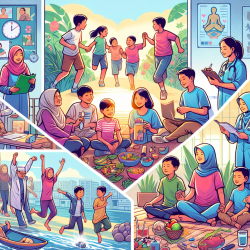Health-related quality of life (HRQoL) is a critical measure in understanding the well-being of children and adolescents. Recent research conducted in Indonesia has provided valuable insights into the HRQoL of young people aged 8-16 years, using instruments such as the EQ-5D-Y-3 L, EQ-5D-Y-5 L, and the PedsQL Generic Core Scales. This study reveals important correlations between HRQoL and various socio-economic factors, offering practitioners a foundation to improve their approaches to pediatric care.
The Study Overview
The study involved a representative sample of 1103 Indonesian children who completed assessments using the EQ-5D-Y and PedsQL scales. The findings indicated that a significant proportion of participants reported problems in various dimensions of HRQoL. Notably, older children and those living in urban areas reported more issues than their younger or rural counterparts.
Key Findings and Implications
- Economic Status: Contrary to common assumptions, children from higher economic backgrounds reported lower HRQoL scores. This suggests that increased academic pressures and stress associated with high economic status might negatively impact children's well-being.
- Gender and Age Differences: Females and older adolescents reported more problems related to emotional well-being. This highlights the need for gender-sensitive approaches and targeted interventions for different age groups.
- Urban vs. Rural Disparities: Urban children reported more issues related to pain/discomfort and emotional distress compared to rural children. This underscores the importance of considering environmental factors in urban planning to enhance children's health outcomes.
Practical Applications for Practitioners
Practitioners can leverage these findings to refine their strategies in supporting children's health:
- Tailored Interventions: Develop interventions that address specific needs based on gender, age, and socio-economic status.
- Mental Health Focus: Given the significant impact of stress on HRQoL, integrating mental health support into routine care could be beneficial.
- Community Engagement: Engage with communities to understand local challenges and design culturally sensitive programs that promote well-being.
Encouraging Further Research
This study opens avenues for further exploration into how socio-economic factors influence children's health outcomes. Practitioners are encouraged to conduct additional research to deepen understanding and improve intervention strategies.
To read the original research paper, please follow this link: Indonesia youth population norms for EQ-5D-Y-3 L, EQ-5D-Y-5 L and the PedsQL generic core scale: lower health related quality of life relates to high economic status and stress.










